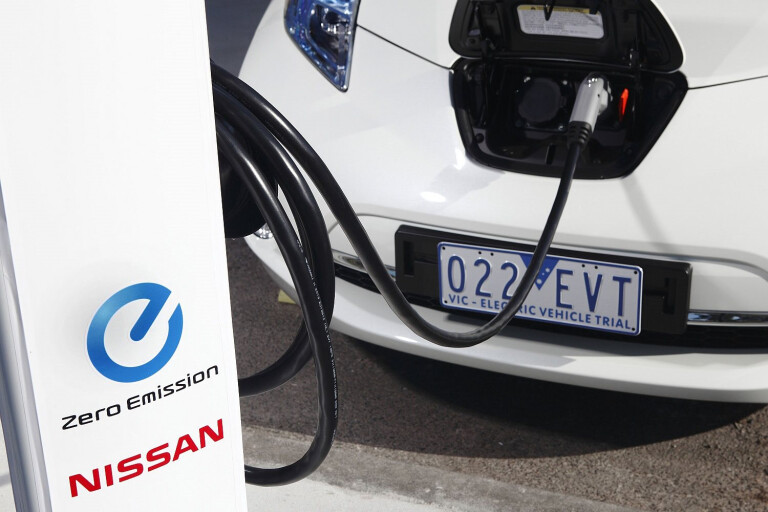
NISSAN has threatened to pull Australia’s cheapest battery-powered car off the market unless it gains taxpayer support, saying it can’t keep losing big chunks of money on each Nissan Leaf it sells.
In a rare public outburst from the upper echelon of the Australian car industry, Nissan managing director Richard Emery admitted the $39,990 EV was a loss-leader for the brand, and that it would struggle to keep the car on sale without some form of cash support from the taxpayer.
Over its three years on sale here, Nissan has sold just over 400 Leafs, including only 31 in the first three months of this year.
It was initially sold for between $46,900 and $51,490, but dropped to its current price of $39,990 in May 2013 after the carmaker said it wanted “to capture the attention of buyers considering an EV who might have previously been put off by the comparatively higher purchase price typically associated with these ground-breaking cars”.
“Ever-tightening emissions regulations overseas have brought about the need for electric cars like the Nissan Leaf,” Emery said.
“Vehicles that have lower emissions, to the point of zero, are very much the future of car-making. It’s why we’ve remained committed to this important vehicle, despite the fact every Nissan Leaf sold in Australia costs our company significant money – they don’t make any profit.
“Yes, we want to sell more of them here. Our competitors want to do the same with their own models. But we can’t do this alone.
“The Australian government only has to help with two things, the same two things some of the world’s biggest economies have been doing for years: give Australian buyers sufficient incentives to buy zero-emission vehicles; and help provide vehicle battery recharging infrastructure for the public to use.”
Emery said the Leaf, which can travel up to 150km on a single charge, was sold in 43 markets on four continents.
“Frustratingly, Australia appears to be the only one without any significant government incentives for a consumer to buy a zero-emissions car,” he said.
“[Federal industry] minister Macfarlane can change this. But if it is a whole-of-government view that electric vehicles are not an option for Australia then we will need to seriously consider our position on the Nissan Leaf electric car.”
The Leaf is larger and more advanced than its only other mainstream brand rival, the $48,800 Mitsubishi i-MiEV that was officially on sale here for a few months but then dropped to order-only status.
BMW Australia said its two battery-fuelled products – the Wheels Car of the Year-winning i3 and plug-in hybrid i8 supercar that’s counted among the official EV numbers even though it has a petrol engine – were both “self supporting” models, but were missing out on incentives designed to make low- and zero-emission cars attractive to buyers.
“Every other major market in the world has incentives or low-emission policies set in place by government,” BMW Australia general manager of corporate communications Lenore Fletcher said.
“We definitely need to see some action to build up general interest.”
Mitsubishi Australia, which sells the $48,800 i-MiEV only to customers who walk into showrooms and order it, said it would not talk about an individual model’s profitability.
However, Mitsubishi Australia head of corporate communications Shayna Welsh said the strong showroom appeal of its Outlander plug-in hybrid electric SUV showed it was a “better fit for Australian lifestyles and driving habits”.
“In fact, our parent company has committed to producing new-model ASX and Pajero with a PHEV powertrain option, so it’s likely we'll see more Mitsubishi plug-in hybrid models in Australia in the near future,” she said.
Nissan, BMW and Mitsubishi join a chorus of carmakers all calling for some form of taxpayer support for low-emission vehicles.
Indian giant Mahindra has even flagged its interest in selling EVs Down Under, saying if it could find a business model that works in the cut-throat Australian market, it could sell EVs anywhere.

COMMENTS